高中英语介词用法记忆口1
- 格式:doc
- 大小:52.50 KB
- 文档页数:11
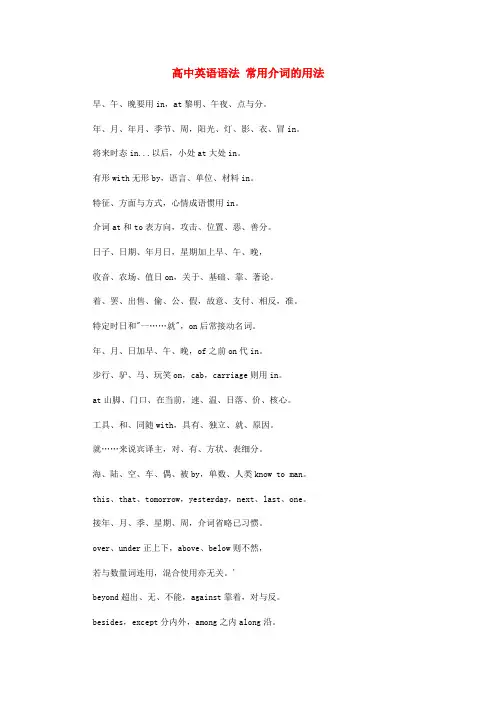
高中英语语法常用介词的用法早、午、晚要用in,at黎明、午夜、点与分。
年、月、年月、季节、周,阳光、灯、影、衣、冒in。
将来时态in...以后,小处at大处in。
有形with无形by,语言、单位、材料in。
特征、方面与方式,心情成语惯用in。
介词at和to表方向,攻击、位置、恶、善分。
日子、日期、年月日,星期加上早、午、晚,收音、农场、值日on,关于、基础、靠、著论。
着、罢、出售、偷、公、假,故意、支付、相反,准。
特定时日和"一……就",on后常接动名词。
年、月、日加早、午、晚,of之前on代in。
步行、驴、马、玩笑on,cab,carriage则用in。
at山脚、门口、在当前,速、温、日落、价、核心。
工具、和、同随with,具有、独立、就、原因。
就……来说宾译主,对、有、方状、表细分。
海、陆、空、车、偶、被by,单数、人类know to man。
this、that、tomorrow,yesterday,next、last、one。
接年、月、季、星期、周,介词省略已习惯。
over、under正上下,above、below则不然,若与数量词连用,混合使用亦无关。
'beyond超出、无、不能,against靠着,对与反。
besides,except分内外,among之内along沿。
同类比较except,加for异类记心间。
原状because of,、 owing to、 due to表语形容词under后接修、建中,of、from物、化分。
before、after表一点, ago、later表一段。
before能接完成时,ago过去极有限。
since以来during间,since时态多变换。
与之相比beside,除了last but one。
复不定for、找、价、原,对、给、段、去、为、作、赞。
快到、对、向towards,工、学、军、城、北、上、南。
but for否定用虚拟,复合介词待后言。
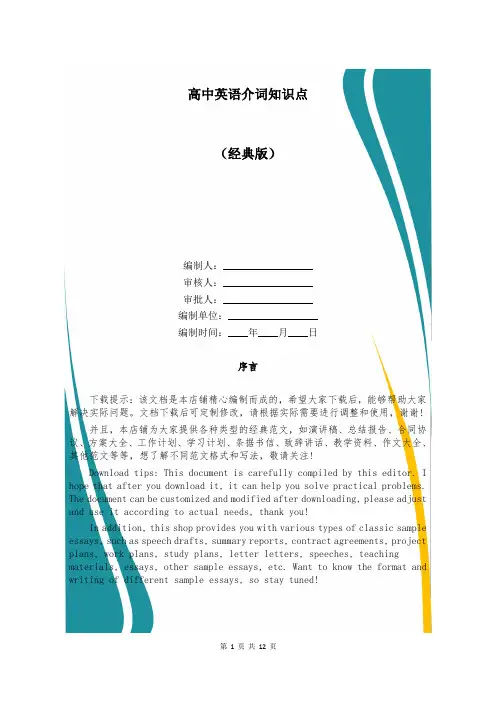
高中英语介词知识点(经典版)编制人:__________________审核人:__________________审批人:__________________编制单位:__________________编制时间:____年____月____日序言下载提示:该文档是本店铺精心编制而成的,希望大家下载后,能够帮助大家解决实际问题。
文档下载后可定制修改,请根据实际需要进行调整和使用,谢谢!并且,本店铺为大家提供各种类型的经典范文,如演讲稿、总结报告、合同协议、方案大全、工作计划、学习计划、条据书信、致辞讲话、教学资料、作文大全、其他范文等等,想了解不同范文格式和写法,敬请关注!Download tips: This document is carefully compiled by this editor. I hope that after you download it, it can help you solve practical problems. The document can be customized and modified after downloading, please adjust and use it according to actual needs, thank you!In addition, this shop provides you with various types of classic sample essays, such as speech drafts, summary reports, contract agreements, project plans, work plans, study plans, letter letters, speeches, teaching materials, essays, other sample essays, etc. Want to know the format and writing of different sample essays, so stay tuned!高中英语介词知识点介词的英语全称为“preposition”是由“前缀pre-(在……前部)+position(位置)”构成的,所以又叫前置词。
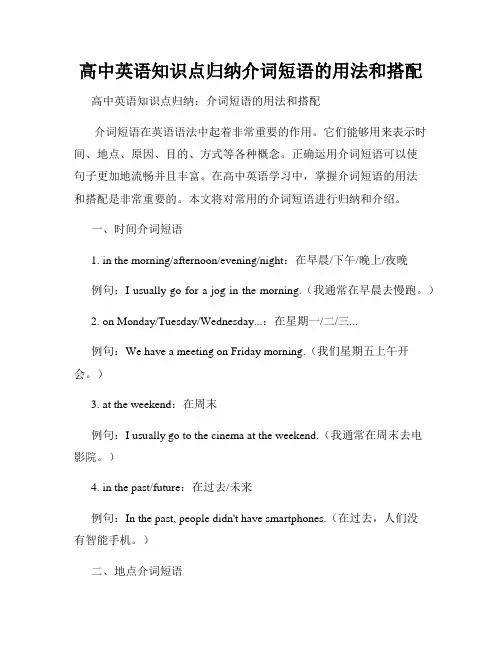
高中英语知识点归纳介词短语的用法和搭配高中英语知识点归纳:介词短语的用法和搭配介词短语在英语语法中起着非常重要的作用。
它们能够用来表示时间、地点、原因、目的、方式等各种概念。
正确运用介词短语可以使句子更加地流畅并且丰富。
在高中英语学习中,掌握介词短语的用法和搭配是非常重要的。
本文将对常用的介词短语进行归纳和介绍。
一、时间介词短语1. in the morning/afternoon/evening/night:在早晨/下午/晚上/夜晚例句:I usually go for a jog in the morning.(我通常在早晨去慢跑。
)2. on Monday/Tuesday/Wednesday...:在星期一/二/三...例句:We have a meeting on Friday morning.(我们星期五上午开会。
)3. at the weekend:在周末例句:I usually go to the cinema at the weekend.(我通常在周末去电影院。
)4. in the past/future:在过去/未来例句:In the past, people didn't have smartphones.(在过去,人们没有智能手机。
)二、地点介词短语1. at the park/school/home:在公园/学校/家里例句:I saw my friend at the park yesterday.(我昨天在公园见到了我的朋友。
)2. in the city/country:在城市/农村例句:I prefer living in the country rather than the city.(我更喜欢住在农村而不是城市。
)3. on the beach/mountain/river:在海滩/山上/河边例句:We had a picnic on the beach last Sunday.(上星期天我们在海滩上野餐。
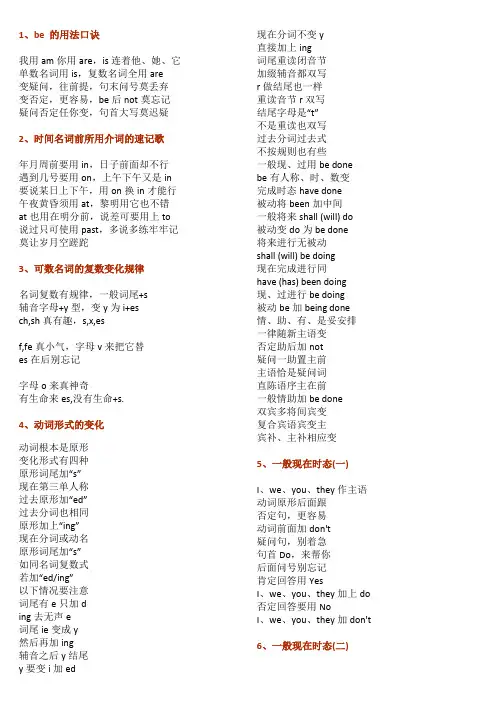
1、be 的用法口诀我用am你用are,is连着他、她、它单数名词用is,复数名词全用are变疑问,往前提,句末问号莫丢弃变否定,更容易,be后not莫忘记疑问否定任你变,句首大写莫迟疑2、时间名词前所用介词的速记歌年月周前要用in,日子前面却不行遇到几号要用on,上午下午又是in 要说某日上下午,用on换in才能行午夜黄昏须用at,黎明用它也不错at也用在明分前,说差可要用上to 说过只可使用past,多说多练牢牢记莫让岁月空蹉跎3、可数名词的复数变化规律名词复数有规律,一般词尾+s辅音字母+y型,变y为i+esch,sh真有趣,s,x,esf,fe真小气,字母v来把它替es在后别忘记字母o来真神奇有生命来es,没有生命+s.4、动词形式的变化动词根本是原形变化形式有四种原形词尾加“s”现在第三单人称过去原形加“ed”过去分词也相同原形加上“ing”现在分词或动名原形词尾加“s”如同名词复数式若加“ed/ing”以下情况要注意词尾有e只加ding去无声e词尾ie变成y然后再加ing辅音之后y结尾y要变i加ed 现在分词不变y直接加上ing词尾重读闭音节加缀辅音都双写r做结尾也一样重读音节r双写结尾字母是“t”不是重读也双写过去分词过去式不按规则也有些一般现、过用be donebe有人称、时、数变完成时态have done被动将been加中间一般将来shall (will) do被动变do为be done将来进行无被动shall (will) be doing现在完成进行同have (has) been doing现、过进行be doing被动be加being done 情、助、有、是妥安排一律随新主语变否定助后加not疑问一助置主前主语恰是疑问词直陈语序主在前一般情助加be done双宾多将间宾变复合宾语宾变主宾补、主补相应变5、一般现在时态(一)I、we、you、they作主语动词原形后面跟否定句,更容易动词前面加don't疑问句,别着急句首Do,来帮你后面问号别忘记肯定回答用YesI、we、you、they加上do 否定回答要用NoI、we、you、they加don't6、一般现在时态(二)主语三单他、她、它动三形式后面压词尾一般s加辅音字母+y型变y为i,esch,sh真有趣s,x,es三个特殊哪里去?has、goes和does否定句,记住它动词前面doesn't疑问句,别着急句首Does,来帮你肯定回答用Yeshe、she、it加does否定回答要用Nohe、she、it、doesn'tDoes、doesn't来帮你后面动词定注意恢复原形要切记7、记住f(e)结尾的名词复数妻子持刀去宰狼,小偷吓得发了慌躲在架后保己命,半片树叶遮目光九个以-f(e)结尾的名词:wife(妻子)、knife(刀子)、wolf(狼)、thief(小偷)、shelf(架子)、self(自己)、life(生命)、half(一半)、leaf(树叶)顺口溜中点出了七个,即thief、wife、knife、leaf、wolf、half和life。
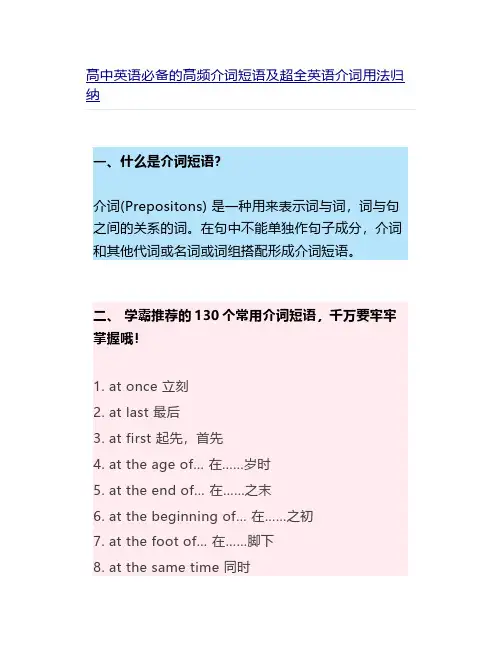
高中英语必备的高频介词短语及超全英语介词用法归纳一、什么是介词短语?介词(Prepositons) 是一种用来表示词与词,词与句之间的关系的词。
在句中不能单独作句子成分,介词和其他代词或名词或词组搭配形成介词短语。
二、 学霸推荐的130个常用介词短语,千万要牢牢掌握哦!1. at once 立刻2. at last 最后3. at first 起先,首先4. at the age of… 在……岁时5. at the end of… 在……之末6. at the beginning of… 在……之初7. at the foot of… 在……脚下8. at the same time 同时9. at night/noon 在夜里/中午10. with one s help 在某人的帮助下11. with the help of… 在……的帮助下12. with a smile 面带笑容13. with one s own eyes 亲眼看见14. after a while 过了一会儿15. from now on 从现在起16. from then on 从那时起17. for example 例如18. far away from 远离19. from morning till night 从早到晚20. by bike/air/train/bus 骑自行车/乘飞机/火车/汽车21. by ordinary mail 寄平信22. by the way 顺便说23. by the window 在窗边24. by the end of… 到……底为止25. little by little 逐渐地26. in all 总共27. in fact 事实上28. in one s twenties 在某人二十几岁时29. in a hurry 匆忙30. in the middle of 在……中间31. in no time (in a minute) 立刻,很快32. in time 及时33. on time 准时34. in public 公开地35. in order to 为了……36. in front of 在……前面37. in the sun 在阳光下38. in the end 最后39. in surprise 惊奇地40. in turn 依次41. of course 当然42. a bit (of) 有一点儿43. a lot of 许多44. a little 一点儿45. on one s way to 某人在去……的路上46. on foot 步行47. a talk on space 一个关于太空的报告48. at/on the weekend 在周末49. on the left (right) 在左(右)边50. on the other side of 在……另一边51. on the radio 通过收音机(无线电广播)52. to one s joy 使……高兴的是53. in bed 卧床54. in life 一生中55. by bus 乘公共汽车56. at home 在家57. in English 用英语58. in the middle 在中间59. in a hurry 匆忙,急忙60. in a minute 一会儿61. by the way 顺便说说/问问62. at the meeting 在会上63. in the sun 在阳光下64. at all 压根儿65. at dinner 在吃正餐66. at the table 在桌子旁67. at work 在工作68. at school 在学校69. at the back of 在……后面70. at the end of 在……结尾71. by hand 亲手72. day by day 日复一日73. one by one 一个接一个74. by spaceship 乘坐宇宙飞船75. in a low voice 大声地76. in a word 总而言之,一句话77. in trouble 处于困境78. in fact 事实上79. in the street 在街上80. in order 按顺序,整齐,正常81. in order to 为了,以便82. in the day 在白天83. in line 成一直线84. in a short while 不久85. in all 总共,总计86. in town 在城里87. in silence 不作声88. out of breath 上气不接下气89. out of sight 消失,看不见90. on duty 值日91. on the left/right 在左/右边92. on the one hand;on the other hand 一方面……;(但是)另一方面......93. on top of 在……顶部94. in the distance 在远处95. out of work 失业96. to this day 直到今天97. at table 在进餐98. at desk 在读书或做作业99. at school 在校上学(指学生)100. at the school 在学校101. at sea 在航海中102. at the sea 在海边103. by day 白天104. by the day 按日105. in class 在上课106. in the class 在这个班107. in bed 卧床,在睡觉108. in the bed 在床上109. in prison 坐牢110. in the prison 在监狱111. in red 穿着红色的衣服112. in the red 负债,亏损113. in hospital 住院(指病人)114. in the hospital(因事)在医院115. in office 在办公,执政116. in the office 在办公室117. in secret 秘密,私下118. in the secret 参入秘密,参入阴谋119. in place of 代替120. in the place of 在……地方121. in case of 万一,以防122. of age 成年人123. of an age 同龄人124. out of office 离职125. out of the office 离开办公室126. out of prison(因犯罪)出狱127. out of the prison(因事)从监狱出来128. out of q uestion 毫无疑问129. out of the q uestion 不可能130. at(the)most 至多常用介词基本用法辨析1. in 表示在某地范围之内。
![高中英语介词大全[1]](https://uimg.taocdn.com/7c2d6265ddccda38376baf16.webp)
高中英语介词大全早、午、晚要用in,at 黎明、午夜、点与分。
年、月、年月、季节、周,阳光、灯、影、衣、帽in。
将来时态in ... 以后,小处at 大处in。
有形with 无形by,语言、单位、材料in。
特征、方面与方式,心情成语惯用in。
3楼特定时日和“一……就”,on 后常接动名词。
年、月、日加早、午、晚,of 之前on 代in。
步行、驴、马、玩笑on,cab,carriage 则用in。
at 山脚、门口、在当前,速、温、日落、价、核心。
工具、和、同随with,具有、独立、就、原因。
4楼就……来说宾译主,对、有、方状、表细分。
海、陆、空、车、偶、被by,单数、人类kno w to man。
this、that、tomorrow,yesterday,next、last、one。
接年、月、季、星期、周,介词省略已习惯。
over、under 正上下,above、below 则不然,若与数量词连用,混合使用亦无关。
beyond 超出、无、不能,against 靠着,对与反。
besides,except 分内外,among 之内along 沿。
同类比较except,加for 异类记心间。
原状because of, owing to,due to 表语形容词。
Under 后接修、建中,of,from 物、化分。
Before,after 表一点, ago,later 表一段。
before 能接完成时,ago 过去极有限。
since 以来during 间,since 时态多变换。
与之相比beside,除了last but one。
复不定for、找、价、原,对、给、段、去、为、作、赞。
快到、对、向towards,工、学、军、城、北、上、南。
but for 否定用虚拟,复合介词待后言。
ing 型由于鉴,除了除外与包合。
之后、关于、在……方面,有关介词须记全。
in 内to 外表位置,山、水、国界to 在前。
如大体掌握如上介词用法口诀,就不易出错。
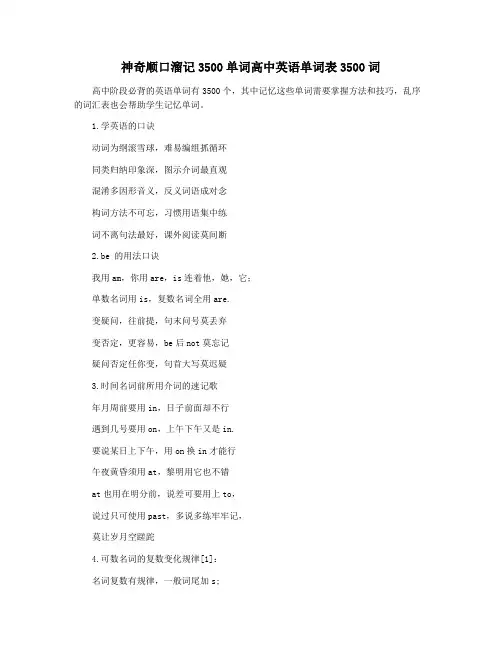
神奇顺口溜记3500单词高中英语单词表3500词高中阶段必背的英语单词有3500个,其中记忆这些单词需要掌握方法和技巧,乱序的词汇表也会帮助学生记忆单词。
1.学英语的口诀动词为纲滚雪球,难易编组抓循环同类归纳印象深,图示介词最直观混淆多因形音义,反义词语成对念构词方法不可忘,习惯用语集中练词不离句法最好,课外阅读莫间断2.be 的用法口诀我用am,你用are,is连着他,她,它;单数名词用is,复数名词全用are.变疑问,往前提,句末问号莫丢弃变否定,更容易,be后not莫忘记疑问否定任你变,句首大写莫迟疑3.时间名词前所用介词的速记歌年月周前要用in,日子前面却不行遇到几号要用on,上午下午又是in.要说某日上下午,用on换in才能行午夜黄昏须用at,黎明用它也不错at也用在明分前,说差可要用上to,说过只可使用past,多说多练牢牢记,莫让岁月空蹉跎4.可数名词的复数变化规律[1]:名词复数有规律,一般词尾加s;辅音字母+y型,变y为i,es;ch,sh真有趣,s,x,es;f,fe真小气,字母v来把它替,es在后别忘记;字母o来真神奇,有生命来es,没有生命+s.5.可数名词复数特殊变化规律[2]:中日好友来聚会,绵羊、鹿、鱼把家回。
男士、女士a变e;牙(齿)、脚双o变双e;孩子们想去天安门,原形后面r、 e 、n;老鼠本来爱大米,mice,ice和rice.注:中Chinese,日Japanese,好友people.绵羊sheep,鹿deer,鱼fish (这些单词单复数一样) man--men woman--women tooth--teeth foot--feetchild--children mouse--mice6.一般现在时态(一)I、we、you、they作主语,动词原形后面跟;否定句,更容易,动词前面加don't;疑问句,别着急,句首Do,来帮你,后面问号别忘记;肯定回答用Yes,I、we、you、they加上do;否定回答要用No,I、we、you、they加don't.(二)主语三单他、她、它,动三形式后面压,词尾一般s加;辅音字母+y型,变y为i,es;ch,sh真有趣,s,x,es;三个特殊那里去?has、goes和does;否定句,记住它,动词前面doesn't;疑问句,别着急,句首Does,来帮你;肯定回答用Yes,he、she、it加does;否定回答要用No,he、she、it、doesn't;Does、doesn't来帮你,后面动词定注意,恢复原形要切记。
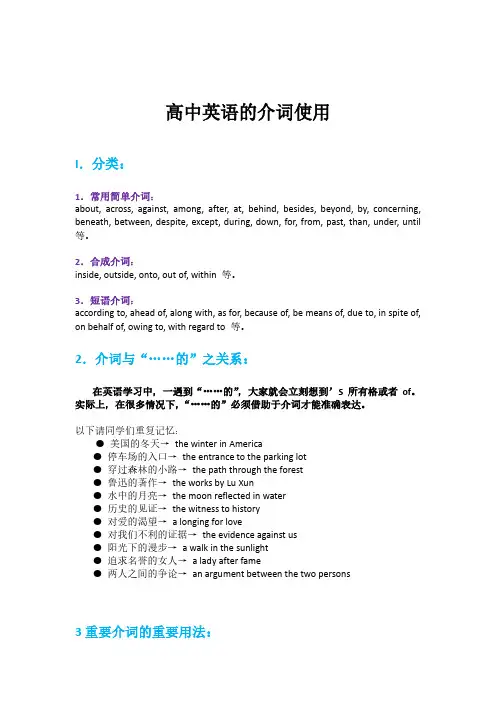
高中英语的介词使用I.分类:1.常用简单介词:about, across, against, among, after, at, behind, besides, beyond, by, concerning, beneath, between, despite, except, during, down, for, from, past, than, under, until 等。
2.合成介词:inside, outside, onto, out of, within 等。
3.短语介词:according to, ahead of, along with, as for, because of, be means of, due to, in spite of, on behalf of, owing to, with regard to 等。
2.介词与“……的”之关系:在英语学习中,一遇到“……的”,大家就会立刻想到’S所有格或者of。
实际上,在很多情况下,“……的”必须借助于介词才能准确表达。
以下请同学们重复记忆:●美国的冬天→the winter in America●停车场的入口→the entrance to the parking lot●穿过森林的小路→the path through the forest●鲁迅的著作→the works by Lu Xun●水中的月亮→the moon reflected in water●历史的见证→the witness to history●对爱的渴望→a longing for love●对我们不利的证据→the evidence against us●阳光下的漫步→a walk in the sunlight●追求名誉的女人→a lady after fame●两人之间的争论→an argument between the two persons3重要介词的重要用法:(1)from:此介词表示“to”相反的方向。
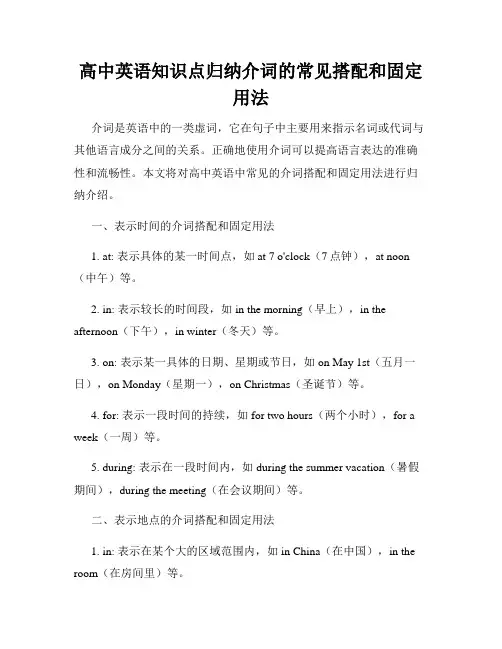
高中英语知识点归纳介词的常见搭配和固定用法介词是英语中的一类虚词,它在句子中主要用来指示名词或代词与其他语言成分之间的关系。
正确地使用介词可以提高语言表达的准确性和流畅性。
本文将对高中英语中常见的介词搭配和固定用法进行归纳介绍。
一、表示时间的介词搭配和固定用法1. at: 表示具体的某一时间点,如at 7 o'clock(7点钟),at noon (中午)等。
2. in: 表示较长的时间段,如in the morning(早上),in the afternoon(下午),in winter(冬天)等。
3. on: 表示某一具体的日期、星期或节日,如on May 1st(五月一日),on Monday(星期一),on Christmas(圣诞节)等。
4. for: 表示一段时间的持续,如for two hours(两个小时),for a week(一周)等。
5. during: 表示在一段时间内,如during the summer vacation(暑假期间),during the meeting(在会议期间)等。
二、表示地点的介词搭配和固定用法1. in: 表示在某个大的区域范围内,如in China(在中国),in the room(在房间里)等。
2. on: 表示在某个较小的平面或曲面上,如on the table(在桌子上),on the ground(在地上)等。
3. at: 表示在某个具体的点上,如at the bus stop(在公交车站),at the cinema(在电影院)等。
4. to: 表示朝向某个地点或方向,如go to school(去学校),look to the future(展望未来)等。
三、表示原因和目的的介词搭配和固定用法1. because of: 表示因为某个原因,如because of the rain(因为下雨),because of his hard work(因为他的努力)等。
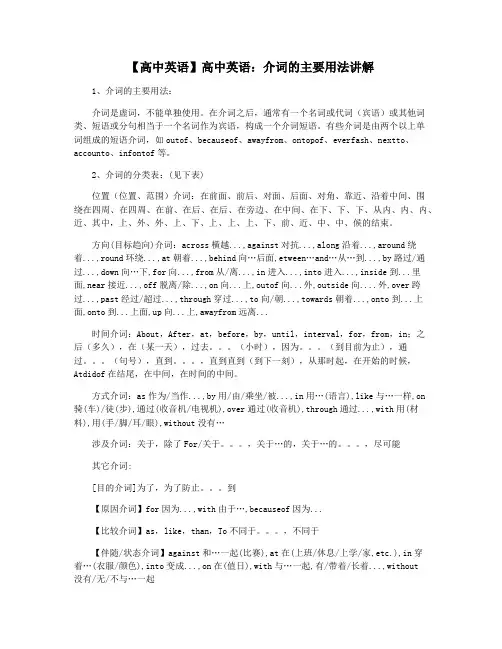
【高中英语】高中英语:介词的主要用法讲解1、介词的主要用法:介词是虚词,不能单独使用。
在介词之后,通常有一个名词或代词(宾语)或其他词类、短语或分句相当于一个名词作为宾语,构成一个介词短语。
有些介词是由两个以上单词组成的短语介词,如outof、becauseof、awayfrom、ontopof、everfash、nextto、accounto、infontof等。
2、介词的分类表:(见下表)位置(位置、范围)介词:在前面、前后、对面、后面、对角、靠近、沿着中间、围绕在四周、在四周、在前、在后、在后、在旁边、在中间、在下、下、下、从内、内、内、近、其中,上、外、外、上、下、上、上、上、下、前、近、中、中、候的结束。
方向(目标趋向)介词:across横越...,against对抗...,along沿着...,around绕着...,round环绕...,at朝着...,behind向…后面,etween…and…从…到...,by路过/通过...,down向…下,for向...,from从/离...,in进入...,into进入...,inside到...里面,near接近...,off脱离/除...,on向...上,outof向...外,outside向....外,over跨过...,past经过/超过...,through穿过...,to向/朝...,towards朝着...,onto到...上面,onto到...上面,up向...上,awayfrom远离...时间介词:About,After,at,before,by,until,interval,for,from,in;之后(多久),在(某一天),过去。
(小时),因为。
(到目前为止),通过。
(句号),直到。
,直到直到(到下一刻),从那时起,在开始的时候,Atdidof在结尾,在中间,在时间的中间。
方式介词:as作为/当作...,by用/由/乘坐/被...,in用…(语言),like与…一样,on骑(车)/徒(步),通过(收音机/电视机),over通过(收音机),through通过...,with用(材料),用(手/脚/耳/眼),without没有…涉及介词:关于,除了For/关于。
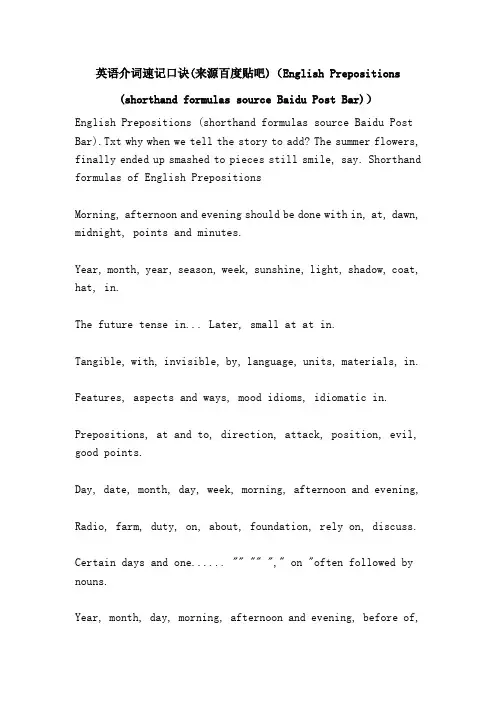
英语介词速记口诀(来源百度贴吧)(English Prepositions (shorthand formulas source Baidu Post Bar))English Prepositions (shorthand formulas source Baidu Post Bar).Txt why when we tell the story to add? The summer flowers, finally ended up smashed to pieces still smile, say. Shorthand formulas of English PrepositionsMorning, afternoon and evening should be done with in, at, dawn, midnight, points and minutes.Year, month, year, season, week, sunshine, light, shadow, coat, hat, in.The future tense in... Later, small at at in.Tangible, with, invisible, by, language, units, materials, in.Features, aspects and ways, mood idioms, idiomatic in.Prepositions, at and to, direction, attack, position, evil, good points.Day, date, month, day, week, morning, afternoon and evening,Radio, farm, duty, on, about, foundation, rely on, discuss.Certain days and one...... "" "" "," on "often followed by nouns.Year, month, day, morning, afternoon and evening, before of,on, in.Walking, donkeys, horses, jokes, on, cab, carriage, in.At at the foot of the mountain, at the entrance, in the current, speed, temperature, sunset, price, core.Tools, and, along with, with, have, independently, and why.Just...... As for the guest, the translator has the right, the right, the square and the list.Sea, land, air, car, couple, by, singular, human, know, to, man.This, that, tomorrow, yesterday, next, last, one.Year, month, season, week, week, omission of prepositions has become accustomed to.Over, under are up and down, above, below is not the case,If used in conjunction with quantitative words, mixed use is irrelevant.Beyond exceeds, does not, cannot, against depends, yes and No.Besides, except, among inside and outside, within along.Comparison of similar except, plus for heterogeneous memory.The original because of, owing to, due to predicativeadjective.After Under, repair, construction, of, from, chemical composition.Before, after, table 1, ago, later, section a..When before can be completed, ago used to be very limited.Since since, during, since temporal multi transformation.By contrast, beside, except last, but, one.Re for, find, price, original, right, give, paragraph, go, for, make, praise.Arrive, right, to towards, work, study, army, city, north, top, south.But for negates the use of dummy, compound prepositions to speak later.Type ing due to identification except for inclusion and inclusion.After, about, in...... In regard to prepositions, remember all.In in to, exterior position, mountain, water and national boundaries to in front.Such as mastering prepositions above formulas, it is not easyto go wrong. Of course, as for the detailed usage of prepositions, the following formulas respectively for example to help you understand your digestion.Detailed explanation:Use in early, late afternoon and lateExample: in the morning in the morningIn the afternoon in the afternoonIn the evening at nightIn the day during the dayAt dawn, noon, night, dot and minuteExamples: at, dawn, at, daybreak at dawnAt noon at noonAt night at nightAt midnight at midnightNone of the above phrases are articlesAt six o'clock at 6 o'clockAt 7:30 (seven thirty) at 7:30At half past eleven at 11:30At nine fifteen at 9:15At ten thirty a.m. can be written at 10:30 in the morning, seven to five, seven minutes to five (more than half an hour)Five, minutes, after, two, five past twoAt, a, quarter, to, two, 1:45At the weekend at the weekendYear, month, year, season, weekThat is, in a "year", "in a month", "in a certain month" (but in some year, month, someday, with on), in the four seasons, in the first few weeks, etc., should use in.Example; in 1986 in 1986In 1927 in 1927In April in AprilIn March in MarchIn December, December 19861986In, July, l983, July 1983In spring in spring, in summer in summer在冬季在冬季秋在秋季在本学期的第一周这学期的第一周在第三周的在第三周在阳光、灯、影、衣、冒即在阳光下,在灯下,在树阴下,穿衣、着装、冒雨等都要用在。
神奇顺口溜记3500个高中英语介词表3500词1. aboard2. about3. above4. across5. after6. against7. along8. amid9. among10. around11. as12. at13. before14. behind15. below16. beneath17. beside18. besides19. between20. beyond21. but22. by23. concerning24. considering25. despite26. down27. during28. except29. for30. from31. in32. inside33. into34. like35. near36. of37. off38. on39. onto40. opposite41. out42. outside43. over44. past45. regarding46. round47. through48. throughout49. to50. toward51. under52. underneath53. until54. up55. upon56. with57. within58. without59. according to60. ahead of61. apart from62. as for63. as of64. as per65. as to66. as well as67. aside from68. because of69. by means of70. due to71. except for72. instead of73. in addition to74. in front of75. in place of76. in regard to77. in spite of78. inside of79. instead80. on account of81. out of82. owing to83. prior to84. with regard to85. with respect to86. with the exception of87. as far as88. as opposed to89. by way of90. in accordance with91. in case of92. in lieu of93. in order to94. in place95. in point of96. in pursuance of97. in relation to98. in response to99. in spite100. in view of 101. on behalf of 102. on the basis of 103. on the eve of 104. on the part of 105. other than 106. out from107. out of place 108. rather than 109. with a view to 110. with reference to 111. along with 112. as against 113. as from114. as of now 115. as regards 116. as to whether 117. as well118. at the back of119. at the discretion of 120. at the expense of 121. at the hands of 122. at the head of123. close to124. for the purpose of 125. from the standpoint of 126. in addition127. in aid of128. in an attempt to 129. in conjunction with 130. in contrast131. in depth132. in excess of133. in favor of134. in front135. in keeping with 136. in line with137. in memory of138. in relation139. in response140. in search of141. in sight of142. in time for143. in tune with144. in view145. near to146. next to147. on account148. on consent of149. on behalf150. on the assumption that 151. on the back152. on the basis153. on the charge154. on the condition 155. on the contrary 156. on the ground157. on the grounds158. on the issue159. on the market 160. on the off chance 161. on the order162. on the part163. on the point164. on the pretext 165. on the principle 167. on the request 168. on the side169. on the strength 170. on the subject of 171. on the supposition 172. on the understanding 173. on the verge174. at the point175. at the rate176. at the risk177. at the sight178. at the suggestion179. at the top 180. at the touch 181. at the turn 182. at the worst 183. at ease 184. at first 185. at full speed 186. at last187. at leisure 188. at peace 189. at present 190. at random 191. at rest192. at school 193. at sea194. at the age of 196. by courtesy of 197. by force 198. by mistake 199. by order of200. by return of post 201. by virtue of 202. by way203. for instance 204. for that matter 205. for the moment 206. for the purpose 207. for the sake of 208. in a minute 209. in a way210. in all probability 211. in any case 212. in any event 213. in brief214. in charge 215. in conclusion 216. in consequence 217. in contrast to 218. in danger 219. in detail220. in doubt 221. in effect 222. in fact 223. in general 224. in honour of 225. in isolation 226. in line 227. in memory 228. in particular 229. in perspective 230. in pieces 231. in prison 232. in private 233. in public 234. in return 235. in revenge 236. in secret 237. in short 238. in so far as 239. in that case240. in this regard 241. in vain 242. in writing 243. instead of 244. on average 245. on behalf of 246. on both sides 247. on condition 248. on duty 249. on earth 250. on fire 251. on foot 252. on horseback 253. on loan 254. on purpose 255. on request 256. on sale 257. on strike 258. on the corner 259. on the floor260. on the ground floor 261. on the left262. on the level 263. on the line264. on the move 265. on the one hand 266. on the other hand 267. on the phone 268. on the point of 269. on the right 270. on the road271. on the shelf 272. on the side of 273. on the side-stand 274. on the stairs 275. on the telephone 276. on the way277. on the way home 278. on time279. on top280. on top of281. on tour282. on trial283. on duty284. on the edge 285. regardless of 286. under age287. under arrest 288. under construction 289. under control 290. under contract 291. under cover 292. under custody 293. under fire294. under oath295. under protest 296. under treatment 297. under way298. at close quarters 299. at full volume300. at half speed 301. at heart302. at home 303. at large304. at length 305. at odds306. at peace 307. at present 308. at short notice 309. at the close 310. at the cost 311. at the end 312. at the expense 313. at the invitation 314. at the limit 315. at the mercy 316. at the moment 317. at the point of 318. at the price 319. at the sight320. at the time 321. at the top of 322. at worst 323. by all accounts 324. by all means 325. by and large 326. by appointment 327. by arrangement 328. by birth 329. by chance 330. by contract 331. by courtesy 332. by day333. by degrees 334. by far335. by hand 336. by heart 337. by implication 338. by instinct 339. by law340. by mistake341. by morning342. by nature343. by now344. by-product345. by return346. by rights347. by sea348. by sight349. by the bay350. by the dozen351. by the hand352. by the hour353. by the lake354. by the minute355. by the name356. by the narrowest of margins 357. by the dozen358. by the piece359. by the way360. by trade361. by turns362. by virtue363. by voting364. by way of criticism 365. by way of introduction 366. by way of thanks367. for all368. for all intents and purposes 369. for all practical purposes 370. for form's sake371. for good372. for good and all373. for long374. for good measure375. for the moment376. for pleasure377. for real378. for size379. for the asking380. for the best 381. for the better 382. for the birds 383. for the heck of it 384. for the hills 385. for the long run 386. for the night 387. for the sake 388. for the time being 389. for the worse 390. for want of 391. in deep water 392. in earnest393. in excess394. in faith395. in favor396. in fear397. in flower398. in front399. in full400. in full force401. in full view402. in future403. in haste404. in health405. in heaven406. in high spirits 407. in history408. in honour409. in kind410. in line411. in loco parentis 412. in love413. in memory414. in my day415. in neutral416. in no uncertain terms 417. in one respect 418. in one's absence 419. in one's best interests420. in one's dotage 421. in one's element 422. in one's own right 423. in one's pocket 424. in order425. in order to 426. in other words 427. in person428. in place429. in practice 430. in preference 431. in principal 432. in reality433. in reason434. in return for 435. in secret436. in session437. in shape438. in sight439. in spite of440. in store441. in style442. in substance 443. in succession 444. in sum445. in terms 446. in the abstract 447. in the act 448. in the air 449. in the basement 450. in the belief 451. in the black 452. in the blue 453. in the business 454. in the case 455. in the center 456. in the city 457. in the clear 458. in the country 459. in the course460. in the dark461. in the dead of night 462. in the depth 463. in the direction 464. in the distance 465. in the dock466. in the east467. in the end468. in the extreme 469. in the fact470. in the fashion 471. in the field472. in the final analysis 473. in the first place 474. in the flesh475. in the game 476. in the garden 477. in the glass478. in the grip479. in the gutter480. in the hand481. in the hard482. in the hole483. in the home484. in the hope485. in the horizon486. in the house487. in the image of488. in the interest489. in the interest of fairness 490. in the lead491. in the line492. in the long run493. in the making494. in the manner495. in the measure496. in the mid-1940s 497. in the mid-1960s 498. in the middle of499. in the mind500. in the money501. in the morning502. in the name503. in the neighbour 504. in the news505. in the night506. in the nude507. in the open508. in the opposite direction 509. in the other510. in the out511. in the oven512. in the party513. in the picture514. in the pocket515. in the post516. in the presence517. in the pub518. in the public interest 519. in the public sector520. in the rain521. in the red522. in the reflection 523. in the report524. in the ring525. in the run-up to 526. in the sector527. in the shade528. in the shape of 529. in the short term 530. in the sight531. in the sky532. in the south533. in the south of 534. in the square535. in the state536. in the street537. in the sun538. in the superlative 539. in the textile industry540. in the top541. in the trust542. in the twilight543. in the under544. in the union545. in the wake546. in the water547. in the way548. in the week549. in the west550. in the window551. in the world552. in -ways553. 伴随554. 较早555. 较高556. 沿途557. 以后558. 逆559. 沿560. 中间561. 在562. 前563. 后564. 下565. 下方566. 旁边567. 除568. 区别569. 于570. 对于571. 围绕572. 和573. 随着574. 以575. 前面576. 后面577. 低于578. 在下方579. 在下面580. 外581. 大约582. 然而583. 由于584. 靠585. 关于586. 认为587. 尽管588. 下来589. 在期间590. 除非591. 对于592. 来自593.在594. 在内部595. 到596. 像597. 靠近598. 从599. 关于 600. 脱离601. 在602. 在外部603. 上604. 过605. 在606. 附近607. 通过608. 在整个609. 到610. 向611. 在下面612. 在底下613. 在旁边614. 除了615. 代替616. 另外 617. 在之间618. 超过619. 但是620. 在621. 有关622. 考虑到623. 尽管624. 往下625. 在626. 在627. 前往628. 在对面629. 退出630. 在外面631. 在上面632. 在633. 总的而言634. 过去635. 关于636. 圆637. 通过638. 整个639. 至640. 向641. 在下面642. 在下方643. 直至644. 向上645. 沿着646. 在647. 没有648. 根据649. 提前650. 除去651. 跟随652. 在653. 有关654. 注意655. 在656. 和657. 在658. 在659. 在660. 作为661. 与662. 在663. 沿着664. 就近665. 取决于666. 作为667. 根据668. 由于 669. 除外670. 而不是671. 除了672. 除外673. 代替674. 附加 675. 在676. 在677. 在前面678. 代替679. 关于680. 尽管 681. 在内部682. 在683. 作为684. 由于685. 关于686. 由于 687. 致688. 对于689. 关于690. 而不是691. 在692. 鉴于 693. 关于694. 对于695.。
目录英语语法顺口溜,让孩子学习英语不再愁高考英语语法实用口诀英语语法顺口溜,让孩子学习英语不再愁利用顺口溜来学习英语,至少有三大好处:一是节省了时间。
死记硬背效果差不说,还费时间,而利用顺口溜,效率又高又省时;二是培养了自己的概括思维能力。
把一些词语编成顺口溜,看似容易,其实也难;三是使人觉得学习英语还是饶有兴趣的。
既然顺口溜有这么多好处,那么,何乐而不为呢?动词为纲滚雪球难易编组抓循环同类归纳印象深图示介词最直观混淆多因形音义反义词语成对念构词方法不可忘习惯用语集中练词不离句法最好课外阅读莫间断be 的用法口诀我用am,你用are,is连着他,她,它;单数名词用is,复数名词全用are.变疑问,往前提,句末问号莫丢弃变否定,更容易,be后not莫忘记疑问否定任你变,句首大写莫迟疑时间名词前所用介词的速记歌年月周前要用in,日子前面却不行遇到几号要用on,上午下午又是in.要说某日上下午,用on换in才能行午夜黄昏须用at,黎明用它也不错at也用在明分前,说差可要用上to,说过只可使用past,多说多练牢牢记,莫让岁月空蹉跎可数名词的复数变化规律[1]:名词复数有规律,一般词尾加s;辅音字母+y型,变y为i,es;ch,sh真有趣,s,x,es;f,fe真小气,字母v来把它替,es在后别忘记;字母o来真神奇,有生命来es,没有生命+s.可数名词复数特殊变化规律[2]:中日好友来聚会,绵羊、鹿、鱼把家回。
男士、女士a变e;牙(齿)、脚双o变双e;孩子们想去天安门,原形后面r、e 、n;老鼠本来爱大米,mice,ice和rice.注:中Chinese,日Japanese,好友people. 绵羊sheep,鹿deer,鱼fish (这些单词单复数一样)man--menwoman--women tooth--teeth foot--feet child--children mouse--mice一般现在时态(一)we、you、they作主语,动词原形后面跟;否定句,更容易,动词前面加don't;疑问句,别着急,句首Do,来帮你,后面问号别忘记;肯定回答用Yes,we、you、they加上do; 否定回答要用No,we、you、they加don't.(二)主语三单他、她、它,动三形式后面压,词尾一般s加;辅音字母+y型,变y为i,es; ch,sh真有趣,s,x,es; 三个特殊那里去?has、goes和does; 否定句,记住它,动词前面doesn't; 疑问句,别着急,句首Does,来帮你; 肯定回答用Yes,he、she、it加does; 否定回答要用No,he、she、it、doesn't; Does、doesn't来帮你,后面动词定注意,恢复原形要切记。
高中英语语法归纳总结介词在高中英语学习中,介词(Preposition)是一个重要的语法知识点。
介词通常用于连接名词、代词、动词或其他词与句子其他成分,起到表示时间、地点、方向、原因、目的等各种关系的作用。
本文将对高中英语语法中常用的介词进行归纳总结,帮助同学们更好地掌握和运用介词。
一、介词的基本概念和分类1. 介词的定义:介词是一类虚词,常由一个或多个字母构成,放在名词、代词或动词等前面,用以表示各种关系,如时间、地点、原因、目的等。
2. 介词的分类:- 时间介词:at, on, in, during, for等。
- 地点介词:in, on, at, by, under等。
- 方向介词:to, from, into, out of, up等。
- 方式介词:with, by, in, without等。
- 原因介词:because of, due to, thanks to等。
- 目的介词:for, to, in order to, so as to等。
二、常用介词用法总结1. 时间介词:- at:用于表示具体的点、时刻或某一天的准确时间,如at 7 o'clock, at noon, at Christmas等。
- in:用于表示较长的时间段、月份、季节、年份等,如in the morning, in May, in winter, in 2022等。
- on:用于表示某一天、日期或具体的星期几,如on Monday, on January 1st, on the weekend等。
- during:用于表示整个时间段或某一时期,如during the summer, during the meeting等。
- for:表示持续的时间段,如for two hours, for a week等。
2. 地点介词:- in:用于表示较大的范围、国家、城市、地区等,如in China, in Beijing, in the classroom等。
介词连词总结知识点高中一、介词的定义和用法1. 介词的定义介词是一类词性,用来连接名词、代词、动名词或相似的词,构成介词短语,起着修饰、限制、说明名词或代词的作用。
2. 介词的用法(1)表示时间、地点、方向等概念。
如:at, in, on, to, from, through, over等。
(2)表示方式、原因、目的等。
如:by, for, of, because of, with等。
(3)用在短语中,表示特定意义。
如:in front of, on top of, by means of等。
3. 介词短语介词短语是由介词+宾语构成的短语结构,它在句子中起修饰名词、代词等作用。
4. 介词的错误用法常见的介词错误包括介词的搭配错误、介词的遗漏和多余、介词放置位置错误等。
二、连词的定义和用法1. 连词的定义连词是一类词性,用来连接词、短语、句子或句子的成分,使之构成完整的句子结构。
2. 连词的分类(1)并列连词:表示并列关系,连接两个或多个相同成分。
如:and, or, but等。
(2)从属连词:用来引导从句,在句子中起连接主句和从句的作用。
如:when, because, although等。
3. 连词的用法(1)并列连词连接两个主语、宾语或谓语等成分,构成并列结构。
(2)从属连词引导从句,表示从属关系,起连接主句和从句的作用。
4. 连词的错误用法常见的连词错误包括并列连词的误用、从属连词的误用等。
三、介词和连词的练习1. 单词记忆和搭配练习通过记忆常见的介词和连词,掌握它们的用法和搭配。
2. 语境搭配练习通过阅读材料,学习介词和连词的用法,掌握它们在语境中正确的使用方式。
3. 句型转换练习通过对句子中的介词和连词进行转换,加深理解和记忆。
四、介词和连词的应用技巧1. 规律记忆掌握介词和连词的规律和常见搭配,以便运用到实际语境中。
2. 多读多写通过多读多写,积累正确使用介词和连词的经验,提高语言表达能力。
英语规律口诀1.英语学习动词为纲“滚雪球”难易编组抓循环同类归纳印象深图示介词最直观混淆多因形音义反义词语成对念构词方法不可忘习惯用语集中练词不离句法最好课外阅读莫间断2.be 的用法口诀我用am,你用are,is连着他,她,它;单数名词用is,复数名词全用are。
变疑问,往前提,句末问号莫丢弃。
变否定,更容易,be后not莫忘记。
疑问否定任你变,句首大写莫迟疑。
(一)巧记名词变复数的规则:名词复数有规律,一般词尾加s;辅音字母+y型,变y为i,es;ch,sh真有趣,s,x,es;f,fe真小气,字母v来把它替,es在后别忘记;字母o来真神奇,有生命来es,没有生命+s.少数名词不规则,特殊情况要强记。
3.f(e)结尾的名词复数:将f 或fe变为v再加es. 巧记:○1妻见小偷架下藏,手拿小刀想杀狼。
Wife、thief、shelf、knife、wolf.谁知落下半片叶,砸在头上一命亡。
Half、leaf、life.○2妻子持刀去宰狼,小偷吓得发了慌;躲在架后保己命,半片树叶遮目光。
但下列单词直接加―s‖:海湾边、屋顶上,首领奴仆两相望;谁说他们无信仰,证据写在手帕上。
Gulf roof chief serf ,belief proof handkerchief这些词直接加― s .‖Safe ----safes 保险箱4. 以“O”结尾变复数加“es”的单词:―黑人(Negro)英雄(hero)爱吃土豆(potato)和西红柿(tomato)。
5.复数形式不难记,中、日友谊是一致;英、法联盟a 改 e , 其余一律加―s‖.5.比较级、最高级Good \ well better best bad \ ill worse worst Many \much more most little less leastFar farther \ further farthest\ furthestOld older\ elder oldest \ eldest巧记:合二为一共三对,―坏、病‖、―两多‖并―两好‖;一分为二有两个,一是―远来‖、二是―老‖;还有一词含双义,只记―少‖来不记―小‖。
There ’s,the otheris Lucy’s.课桌上有两本书,一本是莉莉的,另一本是露茜的。
②表示不定数目中的“一个”与“另一个”,用“one…anotherI don我不要这个,请拿另一个给我看。
③强调确定数目中的“一个”与“其余的”,用one…the others…。
如图所示:going to the cinema.六个学生中,一个将要回家,其余(五个人)要去看电影。
④表示许多人或物中的“一部分”和“另一部分(并非全部)”,用some…walking and others are climbing the hills. 星期日公园里有许多人,有的在散步,有的在爬山。
⑤表示许多人或物中的“一部分”“其余的全部分”,用some…the othersThe hill.Some are carrying water,some are digging,the others are planting trees.二班的学生正在山上劳动,一些人在提水,一些人在挖坑,其余的在植树。
⑥表示“一个接一个地”,用one after another。
如图所示:例如:The students came one after another.同学们一个接一个地来all,both,each的位置巧安排不定代词all,both,each在句中作同位语时,其位置是有规律的,但许多同学却常常用错。
现在教给大家一个灵便的方法:“两前三后”。
一、“两前”即:1.行为动词前。
1)They all attended the meeting.2)We each have a copy of the Chinese-English dictionary.2.半系动词(即行为动词兼作的连系动词)前,如become, get, grow, turn, feel, look, seem, keep等。
1)We both agreed to go.2)The children each had a piece of bread.3)We both became college students.4)My classmates all look fine.二、“三后”即:1.连系动词be之后。
高中英语介词用法记忆口诀(2) 小处at大处in 例:Li and I arrived at Heishan county safe and sound, all is well. Don't worry. 李和我平安地到达黑山县,一切很好,勿念。 I live in a great city (big city), my sister lives at a small town while my parents live at a village. 我住在大城市,我姐姐住在一个小城镇,而我的父母则住在农村。 I'm in Liaoning, at Anshan. 我住在辽宁省鞍山市. 有形with无形by,语言 、单位、材料in 例:The workers are paving a road with stone. 工人们正用石子铺路。(有形) The teacher is correcting the paper with a new pen. 这位教师正用一支新笔批改论文。(有形) "Taking Tiger Mountain by Strategy" is a good opera. <山>>是-出好戏。(无形) The product is separated by distilation into gasoline and gas oil. 这种产品是用蒸馏分离出气油和粗柴油。 (表示方式、手段、方法--无形) I really can't express my idea in English freely in-deed. 我确实不能用英语流利地表达我的思想。 (表示某种语言用in) I wrote a novel in Russian. 我用俄语写了一本小说。(同上) The kilometer is the biggest unit of length in the metric system. 公里是米制中最长的长度单位。 (表示度、量、衡单位的用in ) The length is measured in meter, kilometre, and centimetre. 长度是以米、公里、厘米为单位来计算的。(同上) This board was cast in bronze not in gold. 这个牌匾是铜铸的,不是金铸的。 特征、方面与方式、心情、成语惯用in 特征或状态: 例: The Democratic Party was then in power. 那时民主党执政。 They found the patient in a coma. 他们发现病人处于昏迷状态。 He has not been in good health for some years. 他几年来身体一直不好。 Many who came in despair went away in hope. 许多人带着绝望情绪而来,却满怀希望而去。 The house was in ruins. 这房屋成了废墟。 The poor girl was in tears. 这个贫苦女孩泪流满面。 Her clothes were in rags. 她的衣跟穿破了。 His shoes were in holes. 他的鞋穿出窟窿了。 I only said it in fun. 我说这话只是开玩笑的。 She spoke in grief rather than in anger. 与其说她讲得很气愤,不如说她讲得很伤心。 还有一些短语也用in,如: in jest 诙谐地,in joke 开玩笑地,in spite 恶意地, in fairness 公正地,in revenge 报复, in mercy 宽大,in sorrow 伤心地等。 His mind was in great confusion. 他脑子里很乱。 Today everybody is in high spirits and no one is in low ebb. 今天大家都兴高采烈,没有一个情绪低落的。 She and her classmates are in flower ages. 她和她的同学都正值妙龄。 The compaign was in full swing. 运动正值高潮中。 方面: 例:we accepted the item in principle. 我们在原则上接受了这个条款。
They are never backward in giving their views. 他们从来不怕发表自己的意见。 The backward area has achieved self-sufficient in grain. 这个落后的地区在粮食方面已能自给。 A good teacher must be an example in study. 一个好的教师必须是学习的模范。 方式: 例:All the speeches were taken down in shorthand. 所有报告都用速记记录下来了。 The Party has always educated us in the spirit of patriotism and internationalism. 党一贯以爱国主义和国际主义精神教育我们。 如下成语惯用in 例如: in all 总计 in advance 事前 in the meantime 与此同时 in place 适当地 in hopes of(或in the hope of) 怀着.......希望 in connection with 和……有关 in contact with 和……联系 in addition to 除......以外 in case of 倘若,万一 in conflict with 和......冲突 in force 有效的,大批 in depth 彻底地 in regard to 关于 in the neighborhood of 大约、邻近 in retrospect 回顾,一想起 in behalf of 代表......利益 in the least 一点,丝毫 in alarm 惊慌、担心 in the opinion of 据……见解 in the long run 从长远说来 in one's opinion 在……看来 in word 口头上 in a word 总之 in vain 无益地, 白白地 in case 如果,万一,以防 in detail 详细地 in haste 急急忙忙地 in conclusion 总之 in spite of 尽管 in other words... 换句话说 in return 作为回报 in the name of 以......名义 be confident in 对......有信心 be interested in 对......感兴趣 in doubt 怀疑 in love 恋爱中 in debt 负债 in fun (jest、joke) 玩笑地 in hesitation 犹豫不决 in wonder 在惊奇中 in public (secret) 公开他(秘密地) in a good humour 心情(情绪)好 "介词at、to表方向,攻击、位置、善、恶、分"。 介词at和to都可以表示方向; 用at表示方向时,侧重于攻击的目标,往往表示恶意;用to表示方向时,突出运动的位置或动作的对象,侧重表示善意。试比较下列各句: 1. A.She came at me. 她向我扑过来。 B.She came to me. 她向我走过来。 2.A.Jake ran at John. 几 杰克向约翰扑过去。 B.Jake ran to John. 杰克朝约翰跑去。 3.A. He rushed at the woman with a sword. 他拿着剑向那妇女扑过去。 B. He rushed to the woman with a sword. 他带着剑向那妇女跑过去。 4.A.He shouted at the old man. 他大声喝斥那老人。 B. He shouted to the old man. 他大声向那老人说 5.A.I heard her muttering at Xiao Li. 我听见她在抱怨小李。 B.I heard her muttering to Xiao Li. 我听见她在同小李低声说话。 6.A. She talked at you just now. 她刚才还说你坏话呢。 B.She talked to you just now. 她刚才还同你谈话呢. 7.A.She threw a bone at the dog. 她用一块骨头砸狗。 B.She threw a bone to the dog. 她把一块骨头扔给狗吃。 8.A.He presented a pistol at me. 他用手枪对着我。 B.He presented a pistol to me. 他赠送我一支手枪。 日子、日期、年月日,星期加上早午晚; 以下皆用on。 例: on Octorber the first 1949 1949年10月1日 on February the thirteenth l893 1893年2月13日 on May the first 5月1日 on the first 1号 on the sixteenth 16号 on the second of January 或 on January the second 1月2日
on a summer evening 在夏天的一个夜晚 on Boxing Day 在节礼日(圣诞节次日) on New Year's Day 在元旦